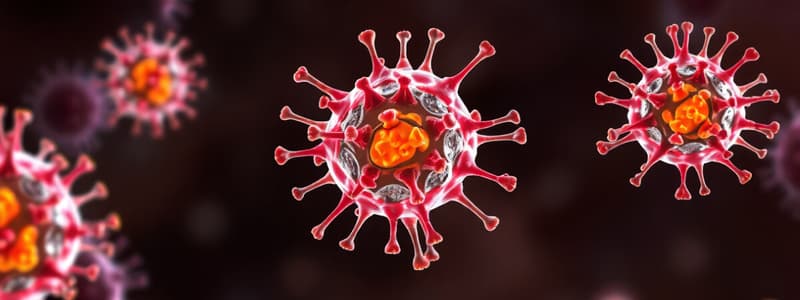Podcast
Questions and Answers
What is the primary function of the immune response?
What is the primary function of the immune response?
To defend the body against bacteria, viruses, abnormal cells, and other foreign substances.
Which of the following is considered the first line of defense in the immune system?
Which of the following is considered the first line of defense in the immune system?
- Production of specific antibodies
- Cytotoxic T-lymphocytes
- Phagocytosis
- Nonspecific mechanical barriers (correct)
What are the main components of innate immunity?
What are the main components of innate immunity?
Epithelial barriers, phagocytic cells, natural killer cells, and cell messengers.
Adaptive immunity responds rapidly to pathogens.
Adaptive immunity responds rapidly to pathogens.
What type of immunity is mediated by B lymphocytes?
What type of immunity is mediated by B lymphocytes?
What role do T cells play in the immune system?
What role do T cells play in the immune system?
The second line of defense includes __________ and inflammation.
The second line of defense includes __________ and inflammation.
Which of the following describes the second line of defense?
Which of the following describes the second line of defense?
Name two types of adaptive immune responses.
Name two types of adaptive immune responses.
Innate immunity can distinguish between self and non-self cells.
Innate immunity can distinguish between self and non-self cells.
Flashcards are hidden until you start studying
Study Notes
Immune Response
- The immune response protects against bacteria, viruses, cancer cells, and foreign substances
- Immune defenses work in 3 lines, the first two are nonspecific and the third is specific
Lines of Defense
- First line: Mechanical barrier (skin and mucous membranes) and secretions (tears & gastric juices)
- Second line: Phagocytosis (neutrophils & monocytes) and inflammation
- Third line: Specific antibodies or cell-mediated immunity (T cells and B cells)
Innate and Adaptive Immunity
- Innate immunity (early reaction): distinguishes self from non-self but can't differentiate between pathogens
- Adaptive immunity (late response): recognizes and reacts to foreign agents and enhances innate immunity
Innate Immunity
- Responds rapidly to microbes
- Major components:
- Epithelial barriers: prevent pathogen adherence and secrete antimicrobial enzymes
- Phagocytic cells (neutrophils & macrophages): engulf and digest microbes
- Natural killer (NK) cells: kill foreign cells
- Cytokines: regulate and coordinate immune activities
Adaptive Immunity
- Acquired through previous exposure
- Recognizes microbes and non-microbial substances
- Components: T lymphocytes (T cells) & B lymphocytes (B cells) and their products
- Two types: Humoral and Cell-mediated
Humoral Immunity
- Mediated by B cells
- Principal defense against extracellular antigens and their toxins
- B cells differentiate into antibody-secreting plasma cells
- Antibodies destroy microbes in blood or mucosal surfaces
Cell-mediated Immunity
- Mediated by cytotoxic T cells
- Eliminates intracellular pathogens (viruses)
- T cells recognize viral peptides on infected cells and signal destruction
Studying That Suits You
Use AI to generate personalized quizzes and flashcards to suit your learning preferences.




